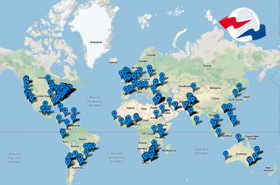Globalization is here to stay
(no votes) |
(0 votes) |
Interview
The term “internationalization” has become the buzzword for Russian scholars. We have asked Donald Wertlieb, Professor of Eliot-Pearson Department of Child Development, Tufts University to comment on internationalization and globalization of knowledge.
Interview
The term “internationalization” has become the buzzword for Russian scholars. We have asked Donald Wertlieb, Professor of Eliot-Pearson Department of Child Development, Tufts University to comment on internationalization and globalization of knowledge.
Do you believe humanity will face the end of internationalization? What are the possible reasons for internationalization coming to a halt? Or is it possible to internationalize, on the one hand, while also localizing, on the other hand?
Do you use the concepts of global and international as synonyms, or there is a distinction between their meanings?
Historically, we first started internationalizing and then recognized the global village. And we also use the term “glocalization”, which addresses the tension you mention.
Globalization is here to stay; it is hard to conceive of a situation that would allow for a return to a more narrow focus.
I think there is no going back, because it is impossible to conceive of a situation in which there would not be a global implication of almost any local commitment. And it is a pretty strong statement. But I think it is a safe statement to make if we think about the kind of impact we expect our graduates to have, in whatever field, whatever the professional commitment and whatever their citizenship responsibilities, especially due to democratization. So the power of any individual citizen increases with these changes and impact at various levels. Thus, I think globalization is here to stay; it is hard to conceive of a situation that would allow for a return to a more narrow focus. It is an empirical question, because we could probably rate different countries or different universities in any country by the extent to which they have incorporated global citizenship as the part of their mission, because as I understand some Russian universities are going to “go global” and others are not. It is a distinguishing feature that those who had the sense or the vision to cultivate their international perspective are indeed more likely to show better outcomes and sustainability.

Most Russian universities are willing to become international. But it is obvious to them that going global is quite expensive. Do you see any cheaper options in terms of internationalization for universities?
Well you can pay now or pay more later, that is one strategy. If I were running a university I would have to assess when to make my investment.
What are the alternative niches? One can have an international focus that is not fully global and has more regional specialization. Some American universities are especially well known because of their focus on Southern countries or European studies, for example. The other thing that comes to mind with your question is to what extent these global commitments are collaborative. One of the early versions of collaboration is sending students abroad to study. This is an exchange of resources both at student and faculty level. There are many universities, Russian universities as well, that are looking to bring in students, especially full-paying customers. So there are some costs that are shared and that can make it cheaper.
And then I would have to understand what the soviet system was and your own experience. Was that a good deal or was it not a good deal? Was it cheap or expensive to send out specialists and bring in students?
For me, the teacher-student relationship is a very personal, face-to-face interaction. The quality of online education is still really problematic and there are a lot of problems that have yet to be overcome.
I’ve just come back from Cuba, so I have seen the emerging US-Cuba cooperation model. How it is constructed here, and what it might look like for the Americans who visit Cuba once in a while are probably very different stories, but it is a very important example of globalization and internationalization. It is probably not very cheap, though.
Regarding student mobility and internationalization, what do you think about online education? How can it influence internationalization? And do you think it can replace the face-to-face method?
I don’t get it, I can`t imagine it. But there is no doubt about it, that’s what is happening. And, for the moment, I hold on very strongly to notions of a hybrid combining human and machine. For me, the teacher-student relationship is a very personal, face-to-face interaction. The quality of online education is still really problematic and there are a lot of problems that have yet to be overcome. So, at the moment, I continue to view some kind of hybrid education more favorably.
Could you tell us about the Talloires Network, and the benefits that universities can get from joining it?

At this point we are close to 300 universities around the world, on all continents, with a shared commitment in terms of mission and action in terms of the universities’ social responsibility or social engagement. Universities have a great deal to offer and a great deal to gain by being a part of the community rather than apart from it. The benefits across all dimensions in terms of the quality of research, the quality of teaching and other criteria that a university or student might use in their assessment cannot but be enhanced by virtue of that kind of engagement. The advantages from participating in the Network are that you have a community of “likeminded” explorers, a kind of a “movement”. And it is a movement that takes various forms in many countries and it’s certainly a global platform for sharing effective practices. And, to use the terms we were using earlier, it becomes an organizing framework for any particular national or regional organization to organize itself as a subsystem of a broader network.
What do you think is your network’s biggest success case? What university could be viewed as the network’s success-story?
I could focus on some examples of better cases, I hesitate to say “best.” My first impulse is to go to my own university, which is something I do not want to do because that would be more self-centered. But, despite that, I will pick it again, for the purposes of there being some similarity and some personal investment, and talk about what I have seen happen at the university in Ukraine that I have been affiliated with through a student exchange under the Fulbright system. It takes a few faculty champions, in which particular faculty members were attracted to a kind of network globalized approach.
Universities have a great deal to offer and a great deal to gain by being a part of the community rather than apart from it. The benefits across all dimensions in terms of the quality of research, the quality of teaching and other criteria that a university or student might use in their assessment cannot but be enhanced by virtue of that kind of engagement.
This particular university, Petro Mohyla University in Mikolayev, where we have interdisciplinarity, which is not a word that has come up yet but has to come up. When we talk about globalization, we mostly talk in terms of geography. But if we also consider the geography of knowledge, the view that the old disciplines are “boring” or limited, and that there are few social problems that we need to address that are really only in the province of any one discipline, or even of any two or three. So interdisciplinarity is another metaphor for globalization.
But the interesting fact is that this particular university used the community engagement and service-learning frameworks, and has intertwined cross-school interdisciplinary work. For instance, one student was working on an interesting issue relating to children with disabilities. Enhanced learning evolved so that in a post-soviet society that is democratizing and where there is increasing awareness of human rights and social exclusion of people with disabilities, and also awareness of both national and international treaties and statements that don`t play “exclusion-is-OK” anymore, meaningful engagement in the community benefitted all. You had student projects that took university students into, as you call them “internat,” or orphanages. So imagine students going from universities into an internat, when most students do not even know it exists and it is only a mile away. And eventually take students from the “internat” into the university environment. This involved the social work school, education, psychology, as well as the medical school. It also meant including the university in a global, international issue as well as a very personal and local kind of concern.
When we talk about globalization, we mostly talk in terms of geography. But if we also consider the geography of knowledge, the view that the old disciplines are “boring” or limited, and that there are few social problems that we need to address that are really only in the province of any one discipline, or even of any two or three. So interdisciplinarity is another metaphor for globalization.
In these cases the students involved were also exchange students under Fulbright system. So they have seen some of these practices in other countries and then they went home, and challenged and advanced their own universities and communities.
Just a small remark about interdisciplinarity: it is vital to the future of academia and universities, but my only concern is about how effective these new interdisciplinary approaches will be.
This is an open question. Historically, for instance, I am a psychologist, and there was no such discipline 120 years ago, so the emergence of any new discipline was great. Much of the 20th century saw a strong disciplinary base for psychology. Now in the 21st century, psychology more often is an element of interdisciplinary research, policy and practice, e.g., cognitive studies, developmental science. We will see how the commitment to involving oneself and one discipline in an interdisciplinary venture develops. I think it is probably not going to take long. I think for instance public health is a discipline, yet it is a made up of many.
Political science is another good example. My own field “child development” is not one discipline under some definitions, but it is actually a multi-discipline field. So I think there is a very complex developmental process to knowledge that we would use to get around the particular position that you proposed there and that would be interesting to see.
Returning our focus to the synergies among higher quality university education and community engagement, it will be joint ventures among students, faculty, and people in the community that advance both knowledge and the society’s well-being, locally and globally.
Interviewers: Ivan Timofeev, RIAC Program Director
Ekaterina Chimiris, RIAC Program Manager
(no votes) |
(0 votes) |



